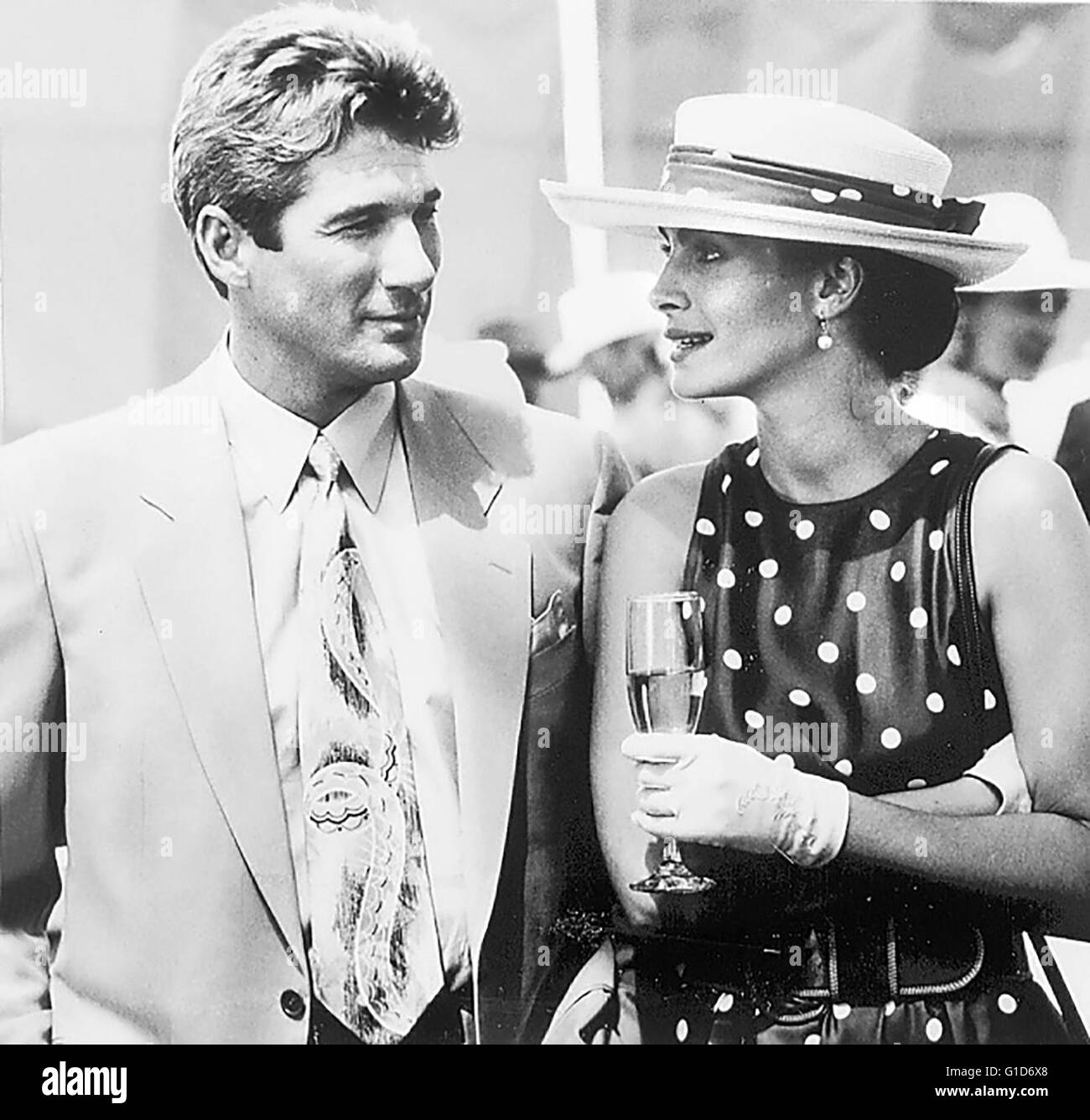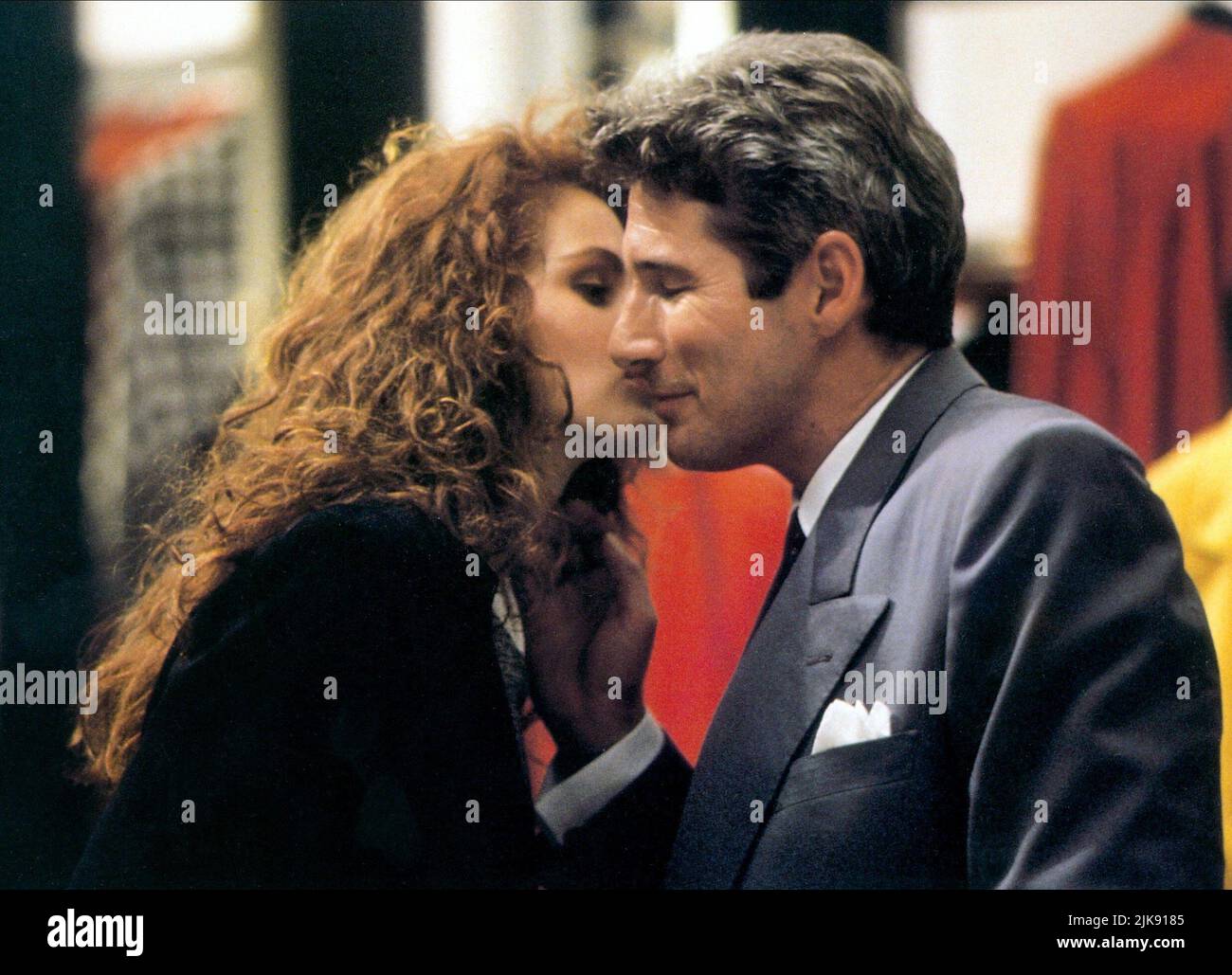"Pretty Woman" Secrets: Gere & Roberts' Iconic Romance & More!
Can a fairytale really happen in the heart of Hollywood, amidst the glitz, glamour, and, perhaps, a little bit of grit? "Pretty Woman," the 1990 romantic comedy, proves that it absolutely can, weaving a story of unlikely love that continues to captivate audiences even decades after its release. The film's enduring popularity stems from its heartwarming narrative, the undeniable chemistry between its leads, and its ability to transport viewers to a world where anything seems possible, even a rags-to-riches romance on the bustling streets of Los Angeles.
The film, directed by Garry Marshall, stars the iconic duo of Richard Gere and Julia Roberts. It charts the course of Vivian Ward, a resourceful and spirited woman working on the streets, and Edward Lewis, a wealthy and sophisticated businessman. Their paths cross by chance, leading to an arrangement that blossoms into something far more profound than either of them anticipated. The films success is not solely due to its narrative, but also its memorable characters, quotable lines, and unforgettable scenes. It's a testament to the power of love and the enduring appeal of a good story, offering an escape into a world where dreams take flight.
| Aspect | Details |
|---|---|
| Title | Pretty Woman |
| Release Year | 1990 |
| Director | Garry Marshall |
| Main Actors | Richard Gere, Julia Roberts |
| Genre | Romantic Comedy |
| Setting | Los Angeles, California |
| Notable Scenes | Jewelry box scene, shopping spree, opera visit |
| Key Themes | Love, transformation, class disparity, self-discovery |
| Budget | $14 Million |
| Box Office Gross | $463.4 Million |
| Music | Soundtrack featuring Roy Orbison, Roxette, and others |
| Supporting Cast | Hctor Elizondo, Ralph Bellamy, Laura San Giacomo, Jason Alexander |
| Notable Quotes | "Big mistake. Big. Huge.", "I say good day, sir!", "Welcome to Hollywood! What's your dream? Everybody comes here with a dream, right?", "She rescues him right back." |
| Awards | Nominated for an Academy Award for Best Actress (Julia Roberts) and Best Original Score. |
| Cultural Impact | Iconic fashion moments, memorable soundtrack, enduring popularity. |
| Reference Website | IMDb |
The casting of "Pretty Woman" was crucial to its success. It's difficult to imagine anyone other than Richard Gere playing Edward Lewis, the sharp-witted businessman. Likewise, Julia Roberts' portrayal of Vivian Ward, a character initially defined by her profession, became an iconic role. Roberts infectious smile, her ability to convey vulnerability, and her undeniable charm made Vivian an instant favorite, helping audiences connect with her journey of self-discovery and transformation. The film's magic lies in this perfect casting of Gere and Roberts. Both actors brought depth and realism to their roles, making their unlikely romance believable and deeply affecting.
The film's narrative centers on the unexpected encounter between Vivian and Edward. Edward, a corporate raider, finds himself needing directions in Hollywood, and he asks Vivian for help. Impressed by her quick wit and beauty, he hires her to accompany him to various social events. This arrangement, born out of convenience, evolves into a tender connection that transcends their initial transactional relationship. Their experiences together, from lavish shopping sprees to emotional moments of genuine connection, challenge their preconceptions and gradually draw them closer. The script masterfully portrays the unfolding of their romance, offering a complex study of love and human connection in unexpected circumstances.
Beyond the central romance, "Pretty Woman" offers an insightful commentary on the cultural landscape of the time. The film navigates the complexities of class, societal expectations, and the power of self-respect. Through Vivians journey, the movie explores themes of transformation and aspiration. Her gradual transformation from a street-smart woman to a poised and elegant lady is not simply a physical makeover; it represents her journey of self-discovery and personal growth. The film doesn't shy away from addressing the harsh realities of Vivian's past, emphasizing the importance of dignity and self-worth. In this way, "Pretty Woman" transcends the romantic comedy genre, becoming a story about a woman who chooses to redefine her own destiny.
Several supporting characters contribute significantly to the film's depth and charm. Hctor Elizondo, as the hotel manager, Mr. Thompson, provides warmth and a sense of grounding. His character acts as a mentor figure to Vivian, offering her guidance and encouragement. Laura San Giacomo and Jason Alexander, as Vivians friend and Edwards lawyer respectively, offer perspectives that further shape the narrative. Ralph Bellamy, in his final performance, plays the role of James Morse, a wealthy businessman, whose interactions with Edward add another layer to the narrative. These supporting roles enhance the films thematic complexity.
The film is packed with iconic scenes that have etched themselves into the collective memory of cinema. The jewelry box scene, where Edward presents Vivian with a necklace, is a prime example of a romantic and memorable moment. The shopping spree scene, where Vivian gets to experience the world of high fashion, highlights her transformation. The opera scene, featuring a classic opera performance, showcases the film's appreciation for the arts. These moments have resonated with audiences for decades, solidifying "Pretty Womans" position as a touchstone of romantic cinema.
The film's visual appeal also plays a critical role in its success. The cinematography and costume design help to tell the story in a very visual and engaging way. The fashion choices, the color palettes, and the staging of scenes all contribute to the film's sense of glamour and fantasy. The film's visual style reinforces the fairytale-like quality of the story, emphasizing the transformative power of love and the allure of Hollywood.
The film's enduring popularity has led to numerous homages and references in other works of media. Many consider "Pretty Woman" as an enduring inspiration for filmmakers. The film's impact on popular culture is undeniable. Its influence can be seen in other romantic comedies and in the way it portrays fashion and aspirational lifestyles. The film has spawned a stage musical, further demonstrating its lasting influence.
The music of "Pretty Woman" also played a significant role in the movie's charm. The Canadian rock musician Bryan Adams' contribution of "Summer of '69" and the soundtrack were very popular, which features a selection of songs that perfectly capture the film's emotional range. The soundtrack, filled with romantic ballads and upbeat pop songs, adds another layer of depth to the film. It serves as an aural backdrop to Vivian and Edwards journey, accentuating the films mood and enhancing its impact.
The financial success of "Pretty Woman" was remarkable. The film earned hundreds of millions of dollars worldwide, a testament to its mass appeal and enduring popularity. It was one of the highest-grossing films of 1990 and received critical acclaim. The film's financial success also led to its lasting presence in the cultural consciousness and helped to elevate the careers of its stars and the director. Its financial performance demonstrated the power of a well-told story, coupled with excellent performances and a compelling narrative.
The movie is more than just a romantic comedy; its a reflection of its era. The film captured the spirit of the late 1980s and early 1990s. The fashion, the music, and the overall aesthetic reflect the cultural trends of the time. The films cultural impact is wide, influencing fashion trends, music, and the portrayal of romance in popular culture. The films setting in Los Angeles, with its blend of glamour and grit, further enhanced its appeal.
There are numerous interesting facts associated with the film. For instance, the role of Vivian Ward was originally intended for other actresses before Julia Roberts secured the part. The film had a different, darker script initially, but the story was reworked into a more optimistic and romantic narrative. These facts are known by hardcore fans, but still have the ability to surprise viewers. The movie's journey to the big screen, from its initial conception to its final form, is as interesting as the story itself.
The film's success lies in its ability to connect with audiences on an emotional level. It explores universal themes of love, social mobility, and self-discovery. Viewers from different backgrounds and walks of life could easily relate to the characters and their experiences. The films message of hope and the possibility of finding love in unlikely places has also contributed to its enduring appeal. "Pretty Woman" remains a classic, delivering a message of love and optimism that transcends generations.
The film's script, full of quotable lines, adds to the films lasting appeal. Phrases such as "Big mistake. Big. Huge." and "I say good day, sir!" have become part of the cultural lexicon. These memorable lines enhance the film's comedic elements and further the audiences connection to the characters. These lines continue to be referenced and celebrated, demonstrating the film's lasting impact on popular culture.
Despite the passage of decades, "Pretty Woman" continues to charm audiences, serving as a timeless reminder of the power of love and the magic of a well-told story. The films success comes from the perfect balance of romance, comedy, and a dash of fantasy. It has a lasting legacy, with the characters remaining loved by many. Its influence on romantic comedies and pop culture will also continue. "Pretty Woman" remains a beloved film, still inspiring viewers to believe in the possibility of their own happily ever after.



